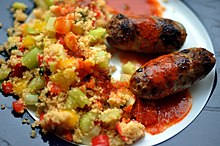Harissa (condiments)
Harissa ( Arabic هريسة, DMG Harīsa ) is a spicy paste from the Maghreb made from fresh chillies , cumin , coriander seeds , garlic , salt and olive oil . Today harissa is known in all of North African cuisine (in Morocco as Sahka ), but also in Arab countries, Israel and Europe. There are different recipe variants in the individual countries, with the Tunisian version being the hottest as it has the largest portion of chili.
For the production of harissa chilli, garlic and spices in a mortar or with a hand blender or blender minced and processed usually with olive oil to make a paste. Sometimes vinegar , mint , coriander , lemon juice or olives are also added. Industrially produced harissa is commercially available in small cans, tubes or glasses (sometimes also in powder form).
It is used in many ways as a condiment, for example for merguez , in soups and sauces, as well as for pasta and rice dishes . In Tunisia, harissa is used as a condiment for almost all dishes and is even eaten as a spread for breakfast. In the Middle East , harissa is served with mezze and couscous .
Chilies were thought to have been introduced to North Africa by the Spanish , who occupied part of Tunisia from 1535 to 1574 before the Ottomans conquered Tunisia .
Tunisia is the largest exporter of manufactured harissa. In 2006, the Tunisian production of Harissa was 22,000 tons (about 40,000 tons of paprika were produced at the same time). Tunisian harissa is often made with chilies, which are relatively mild and number 40,000–50,000 on the Scoville scale . Another major producer is Algeria's Annaba Province, where significant consumption also takes place.
literature
- Kitty Morse: Recipes from the Kasbah . Christian, Munich 1999, ISBN 3-88472-373-1 , p. 39 .
Web links
Individual evidence
- ↑ a b c Susheela Uhl: Handbook of Spices, Seasonings and Flavorings . 2000, p. 69 f .
- ↑ Gil Marks: Olive Trees and Honey. A Treasury of Vegetarian Recipes from Jewish Communities around the World . Wiley, Hoboken (NJ) 2005, ISBN 978-0-7645-4413-2 , pp. 433 .

